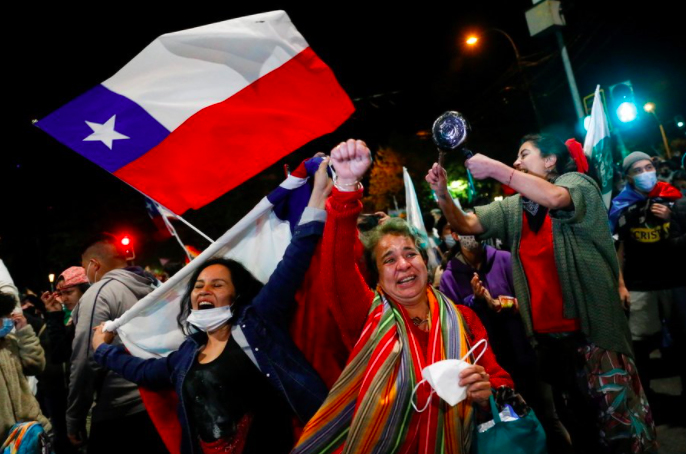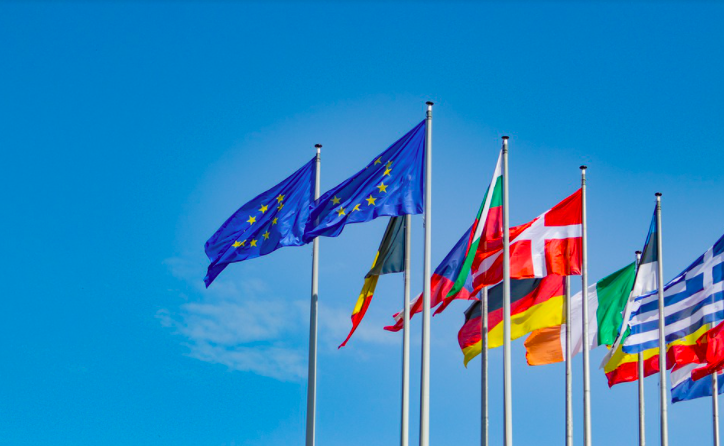Bitcoin in El Salvador: A New Era of Digital Currencies as Legal Tender
By Alan Jurcak.
El Salvador adopted Bitcoin as legal tender last year, and its president has grand plans for the country’s future with the aid of the digital currency. Can El Salvador prove to be a case study into the proliferation of new financial systems?
Read More
A New Constitution for Chile: will citizens get what they protested for?
By Kayla Hobby Kolbe.
Social inequality lead to mass protests at the end of 2019 in Chile. As a result, the country has elected a Constitutional Convention of 155 representatives to draft a new constitution. The new constitution will address the inequities, climate change, mining regulations, and a host of other issues facing the country.
Read More
Saudi Arabia’s New Personal Data Protection Law: What are the New Regulations
By Victoria Hansen.
In March of this year (2022), Saudi Arabia’s new personal data law data law will go into effect making it the first middle eastern country with a law protecting personal data. What new changes are in store for data controllers?
Read More
No Friends But the Mountains – How Belarus Used Migrants and Refugees to Orchestrate a Border Crisis
By Lindsey Gergel.
Frustrated over UN sanctions, Belarusian president Lukashenko orchestrated a migrant crisis on the Poland-Belarus border. Now, with nowhere to turn, migrants on the border are freezing to death.
Read More
Indigenous Language Rights in Peru: First Came the Law, Now Comes the Change.
By Abby Cote.
After centuries of oppressing indigenous languages, Peru constitutionally protected indigenous language speakers in its 1993 Constitution. Despite this, indigenous languages continue to be oppressed and shamed. This article examines the legal history of language rights in Peru, and the social barriers that keep them from being recognized.
Read More
1 . . . 2. . . 3 . . . 4 . . . When will Australia Stop the War (on Asylum Seekers)?
By Nichelle Christopherson.
Despite outcry by the international community, Australia continues to tighten reigns on immigration. However, in doing so it is denying asylum seekers the right to seek protection as is required by international law.
Read More
China Turns to Hong Kong to Violate People’s Rights while the World Idly Watches
By Jordan Chrispell.
In response to Hong Kong’s widespread protests demanding basic rights, China imposed a sweeping national security law on the city. The Chinese government threatened to “smash bodies” of protestors while the international community feebly criticized its actions.
Read More
How the Pandemic Pressured Canada to Rethink Immigration
By Maggie Belcher.
Canada reached its goal of 401,000 new permanent residents in 2021; that is the most since 1913. During a global pandemic, how was the goal possible and why was meeting it so important?
Read More
Environmental Issues Along the U.S-Mexico Border
By Armando Barcena.
The United States and Mexico have been forced to deal with environmental issues affecting the border region such as concerns over clean water, air pollution, and waste management. Together the United States and Mexico have worked to address the environmental issues on both sides of the border through their Border Programs.
Read More
Can Japan Aid in Refuge Crises?
By Tyler Armstrong.
Japan has remained hesitant to bring foreigners in on a permanent basis for generations. However, as a global leader in modern times, the nation is expected to provide aid to other troubled nations or populations. This brief article will discuss Japan’s recent approaches to refugee aid and how accepting more refugees into the country may not be the best plan of action.
Read More
How Iceland’s Parental Leave Act Has Allowed Iceland to Become the Most Gender Equal Country in the World
By Haley Tenelshof.
Iceland’s Parental Leave Act has re-distributed childcare responsibilities by allowing both maternity and paternity leave. This, in turn, has allowed women to stay in the labor market and pursue career opportunities rather than leave the labor market or be fired for taking care of their children.
Read More
Venezuelan Humanitarian Crisis: A Light at the End of the Tunnel
By Camille Loftin.
The socio-political and economic crisis in Venezuela has worsened, especially as the COVID-19 pandemic swept through a nation that already lacked adequate access to basic necessities. Venezuela’s need for foreign aid has been neglected for years as political tensions continued to rise. Fortunately, the first step towards providing humanitarian aid to Venezuelans has been made as the United Nations and Venezuela strike a deal that does not require foreign assistance to be tied to a political party.
Read More
Tulip Tower: Dutch Labor Unions’ Heightened Place Within Then Netherlands
By Mason VanGorp.
This post analyzes the positives and potential negatives of Dutch labor unions’ intriguing ability to effect economic legislation within the Netherlands’ government as a member of the Social-Economic Council.
Read More
The Intersection of Law and the Cryptocurrency Market: How China’s Increased Ban on Bitcoin Effects the Global Digital Currency Market
By Mitchell Purdy.
This post provides an explanation of Bitcoin, its history with the People’s Republic of China, and considers the significance of the recent Chinese bans on Bitcoin. Ultimately, the intention of this post is to encourage debate on the salient question of whether decentralized digital currencies have a valuable and legitimate place in the global market.
Read More
Internet Privacy for Children: The UK’s Age Appropriate Design Code
By David Rosado.
In 2020, the UK’s Age Appropriate Design Code went into force. Now that the twelve month transition period is over, companies must come into compliance or risk a fine.
Read More
The Taliban Takeover in Afghanistan: A Use Case for Blockchain Technology as a Vehicle for Asset Security Amidst Civil Unrest
By Alan Jurcak.
With the Taliban's takeover of Afghanistan solidified, many citizens have found themselves unable to access or transfer their savings through traditional financial institutions. Some are even forced to abandon their land and property to escape the new regime. Could cryptocurrencies and blockchain technology provide the asset security that is desperately needed during instances of political unrest?
Read More
Turkey versus Google: The Next Wave of Antitrust Regulations
By Sara Imam.
The Turkish Competition Authority recently fined Google $36.6 Million for the company’s anti-competition practices. This blog addresses the growing regulations that aim to offer consumers organic search results, along with mitigate Google’s monopolistic practices.
Read More
Canada Reopens its Borders to Tourists After Over a Year or Restrictions. How Will it Continue to Regulate Short-Term Rentals?
By Lindsey Gergel.
In the last decade or so, short-term rentals have taken the world by storm, allowing people all over the world to rent out their properties to vacationers and tourists. The increase in demand for short-term rentals is not without controversy, however, and regulation differs across Canada.
Read More
How Poland’s Conservative Government Stacked the Highest Court to Create Near Total Ban on Abortion Against the Will of the People
By Jordan Chrispell.
The conservative government in Poland stacked the country’s highest court to pass near total abortion ban. Activists are working hard to provide abortion access to people while protesting the law.
Read More
The Impending Return of Guatemala’s “Amnesty Law”
By Nichelle Christopherson.
In February 2021, Guatemala’s Constitutional Court issued an injunction striking down Bill 5377, which sought to provide amnesty to perpetrators of war crimes and crimes against humanity committed during the country’s civil war from 1960 through 1996. Despite the Court’s ruling, however, on June 7, 2021, Guatemala’s far-right Valor political party proposed another substantially similar law, otherwise known as the “Amnesty Law.” Proposal of the Amnesty Law represents an extension of the government’s effort to avoid confronting its dark history and continued role in promulgating impunity, the result of which, if passed, will have retraumatizing consequences for the victims and communities who continue to fight for justice to no avail.
Read More




















